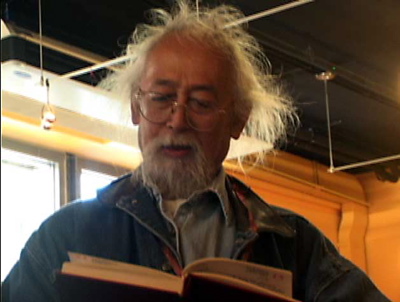A film about Uncle Al Robles premiers in San Francisco
What: Manilatown is in the Heart: A Poetic Documentary film by Curtis Choy
When: August 9th at 7:00 pm
Where: Manilatown Center Gallery- International Hotel- 868 Kearny St San Francisco
 |
|
by Tony Robles
And the best There has been no bigger influence on my life as a writer and activist than the poet Al Robles, my uncle. Uncle Al carries a sack of water buffalo tales as he walks the streets of the city. His eyes have seen the manongs--Pilipino old timers who first came to America in the 20's. His ears have heard their songs, their cries and their laughter. His hands have eaten fish and rice with the manongs in small rooms of the International Hotel. The poetry of Al Robles is the struggle of the Manongs and the Issei and the Chicanos and the black folks of the Fillmore. The poetry of Al Robles is in the struggle of our people. Uncle Al has been a huge influence to an entire generation of Pilipino-American writers and activists. He is what we at POOR Magazine call an "Organic Intellectual"-- not indoctrinated with the impersonal underpinnings of the academic institutions but firmly rooted in the community. My own children's books, "Lakas and the Manilatown Fish" and "Lakas and the Makibaka Hotel" would not have been possible without his presence and influence in my life. Uncle Al was born in the Fillmore District of San Francisco to a Pilipino family of 10. His ears tasted the thick melodies of jazz swirling through the air of clubs Such as Jack's and Jimbo's bop City. In the jazz of his youth he felt the sadness and love and beauty in singers such as Billie Holiday. He saw Pilipino jazz musicians such as Flip Nunez whose fingers passed over the keys, "black over white". He and other Filipinos like Bill Sorro ran the streets of the Fillmore seeing the Isseis, the elderly, smelling the smells of gumbo and barbeque and tomato beef chow mein. He saw all the beauty moving all around him--the music, the people, the sorrow. He asked himself, "What is moving?" When I was a kid I used to see him on Clement Street. I would be riding my bike or coming out of King Norman's Toy Store. I'd see him carrying a heavy backpack. He'd take out a brown paper bag and open it. "What is it?" I'd ask. I'd look inside. It was a tape recorder. He'd hit the play button and I'd hear the voices of elderly Pilipinos. They spoke in a thick accent that sounded like my grandmother's. I'd have a hard time understanding what they said. Uncle Al understood. 30 years later I'm starting to understand. Uncle Al is a collector of stories. He has collected the stories of the manongs--our grandfathers and grandmothers who came to America. They endured the racism and classism and police brutality of Amerikkka and in the process gave birth to a generation born in this country. Uncle Al is part of that generation. His poetry and stories tell of the manong generation working as laborers under big agribusiness--workers who organized and fought and formed what eventually became the United Farm Workers Union (UFW). But there was love and beauty in the struggle. His poems talk about the taxi hall dances, where Filipinos paid their meager earnings to dance with a blondie, a dance that would end as quickly as it began. In his poetry the dance lasts a lifetime. At the end of a manong's lifetime, Uncle Al asks: If it takes Why shouldn't the To make love? To a generation of activists and Pilipino-Americans seeking their identity, their roots, he asks: Who's to say And the weeds The influence of my Uncle Al on Pilipino-American poetry is akin to Chuck Berry's influence on Rock & Roll, it is far reaching and ever growing, from established writers to the hip hop generation; his words have touched their hearts and inspired them to get involved in serving our community. But it's not all work. Uncle Al loves to play the piano. Sometimes he'll slip into a cafe with an available piano, playing by ear. In the music you'll hear the voices of the manongs, the elderly Japanese, the Chicanos and the black elders. It'll move you and you'll get up and dance that dance that's a part of all of us; the dance that leads us back to ourselves. That's the real poetry.
August 4th Marks the 31st anniversary of the eviction of tenants of the International Hotel. Come and honor the struggle in a candlelight vigil at the Manilatown Center, 868 Kearny Street, August 4th at 7pm. And celebrate the poetry and laughter of Al Robles at the Manilatown Center August 9th, 7pm at the world premier of the Film, 'Manilatown is in the Heart". Filmmaker Curtis Choy (www.chonkmoonhunter.com), director of "Fall of the I-Hotel", takes us on a trip through the past and present in the world of Al Robles, a world filled with farm laborers, factory workers, Zen monks, pool hustlers, cooks, children, lovers, gamblers, |



